To assemble
| To assemble |
| General measures before assembly |
| • |
Parts and housing should be thoroughly washed before assembly.
|
|
| • |
Check the parts for wear. Change damaged or defective parts.
|
|
| • |
If there was a lot of swarf in the gearbox, all bearings should be replaced. Always change both bearings on one shaft, even if only one is damaged.
|
|
| • |
Change seals at the drive shafts.
|
|
| • |
All bearings and friction surfaces must be oiled before assembly with the same type of oil as used in the gearbox. Refer to
Summary of lubricants and sealants
.
|
|
| 1. |
Mount the clutch housing on a service stand with
87 92 228 Holder, transmission
.
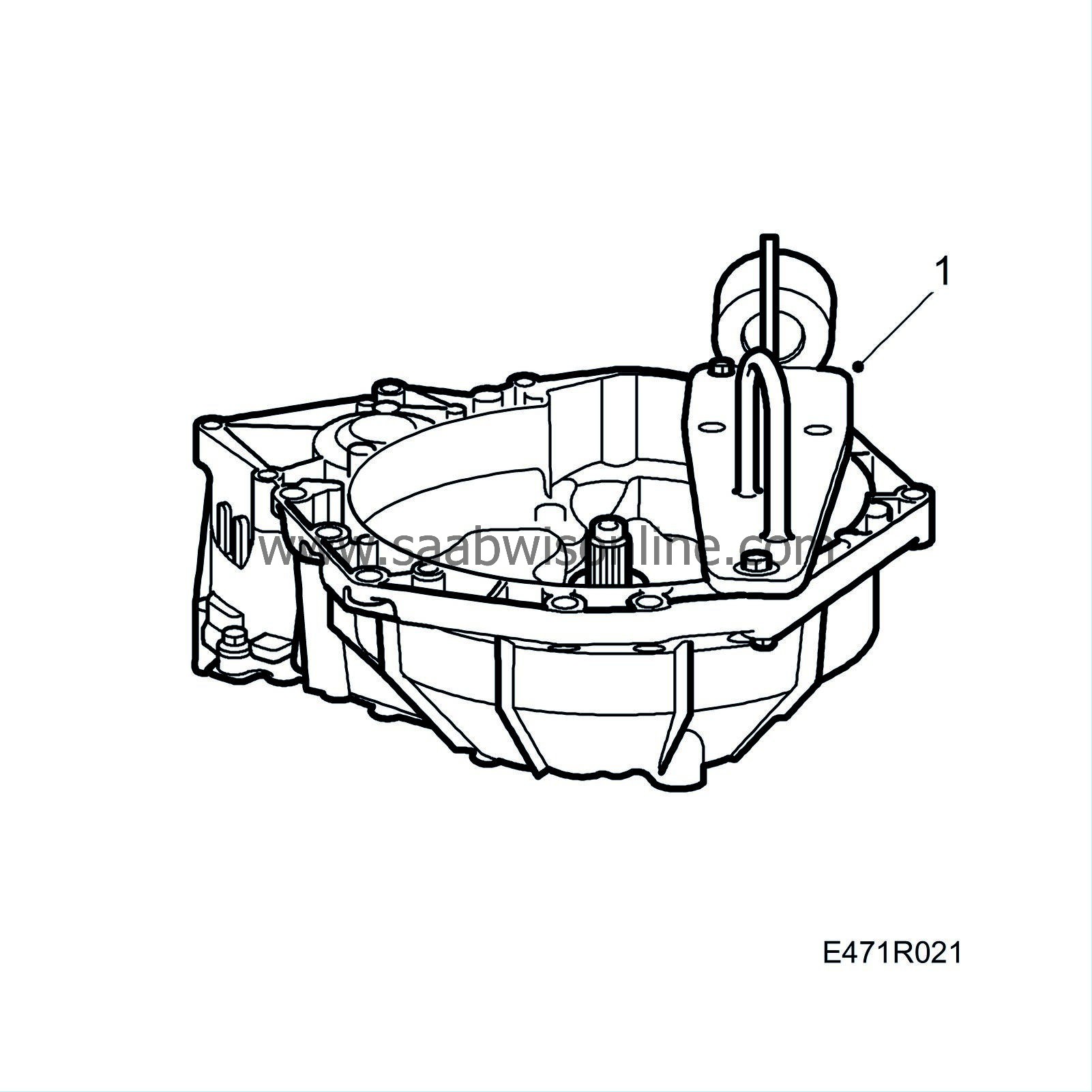
|
|
| 2. |
Carefully scrape off the old sealant residue from the mating surface without damaging the sealing surfaces.
|
|
| 3. |
Fit the differential into the clutch housing and lubricate the bearing.
|
|
| 4. |
Mount the output shaft into its seat, lubricate the bearing and fit the bearing race. Put on the bearing support and tap it down. Use
87 92 202 Sleeve
and
87 91 204 Sleeve, bearing race
. Use
74 96 268 Thread locking adhesive
to all bolts and fit them. Tighten the 3 bolts in the middle alternately.
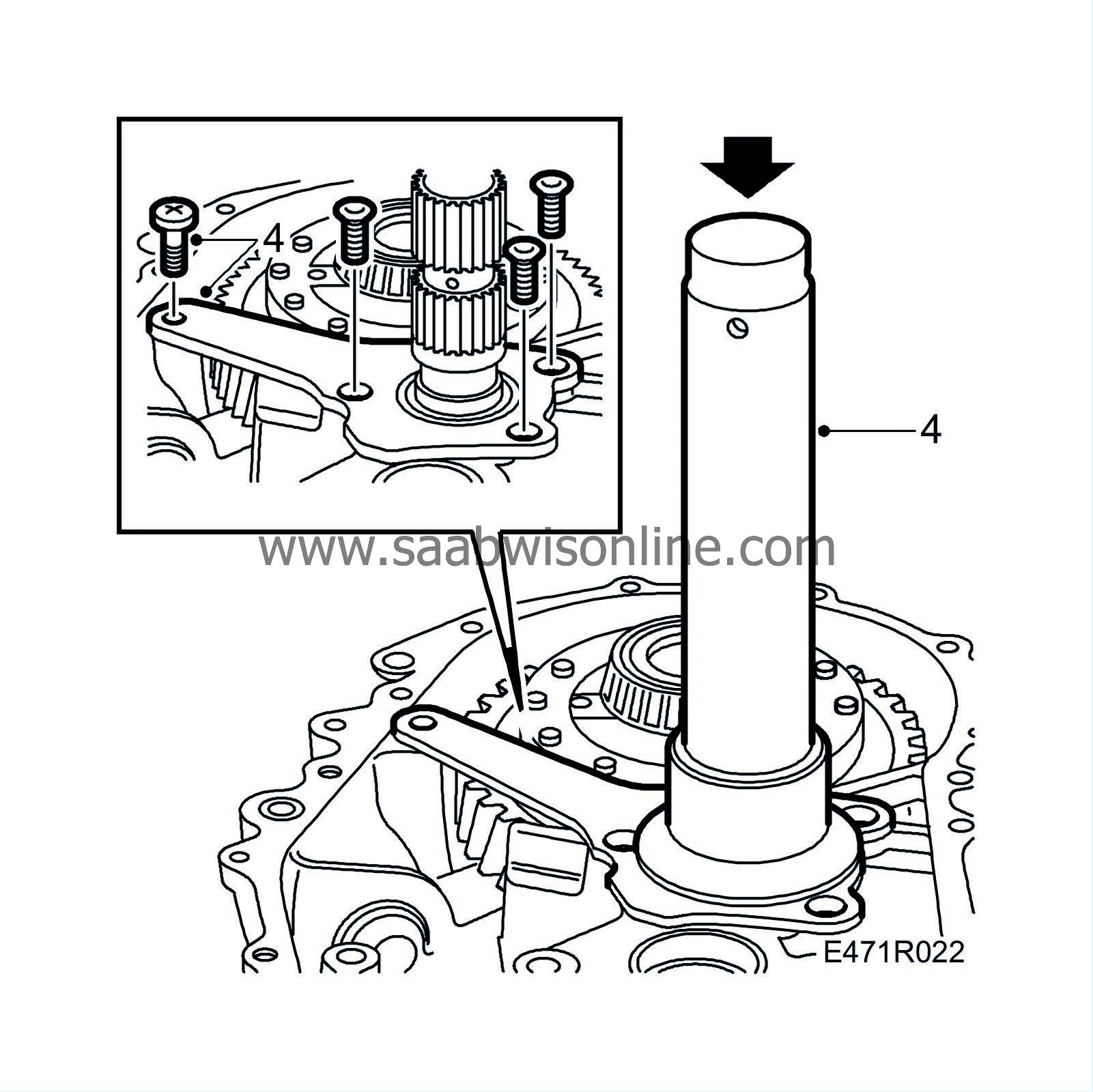
Tightening torque 45 Nm (33 lbf ft) The outer bolts should only be tightened to: Tightening torque 24 Nm (18 lbf ft) |
|
| 5. |
Fit the gear wheels of 1st and 2nd gear with synchromesh assembly on the output shaft using
87 92 103 Assembly fixture, 1
. Then fit the assembled components on the output shaft. Fit the gear wheel of 3rd gear and a new spacer sleeve (paired with clamping sleeve) on the output shaft. Note that the used pinion must face the same way as before, i.e. with
the machined groove up
. Do not let the fitted gears go too far down the shaft, save 15 mm. Otherwise it is not possible to fit the input shaft.
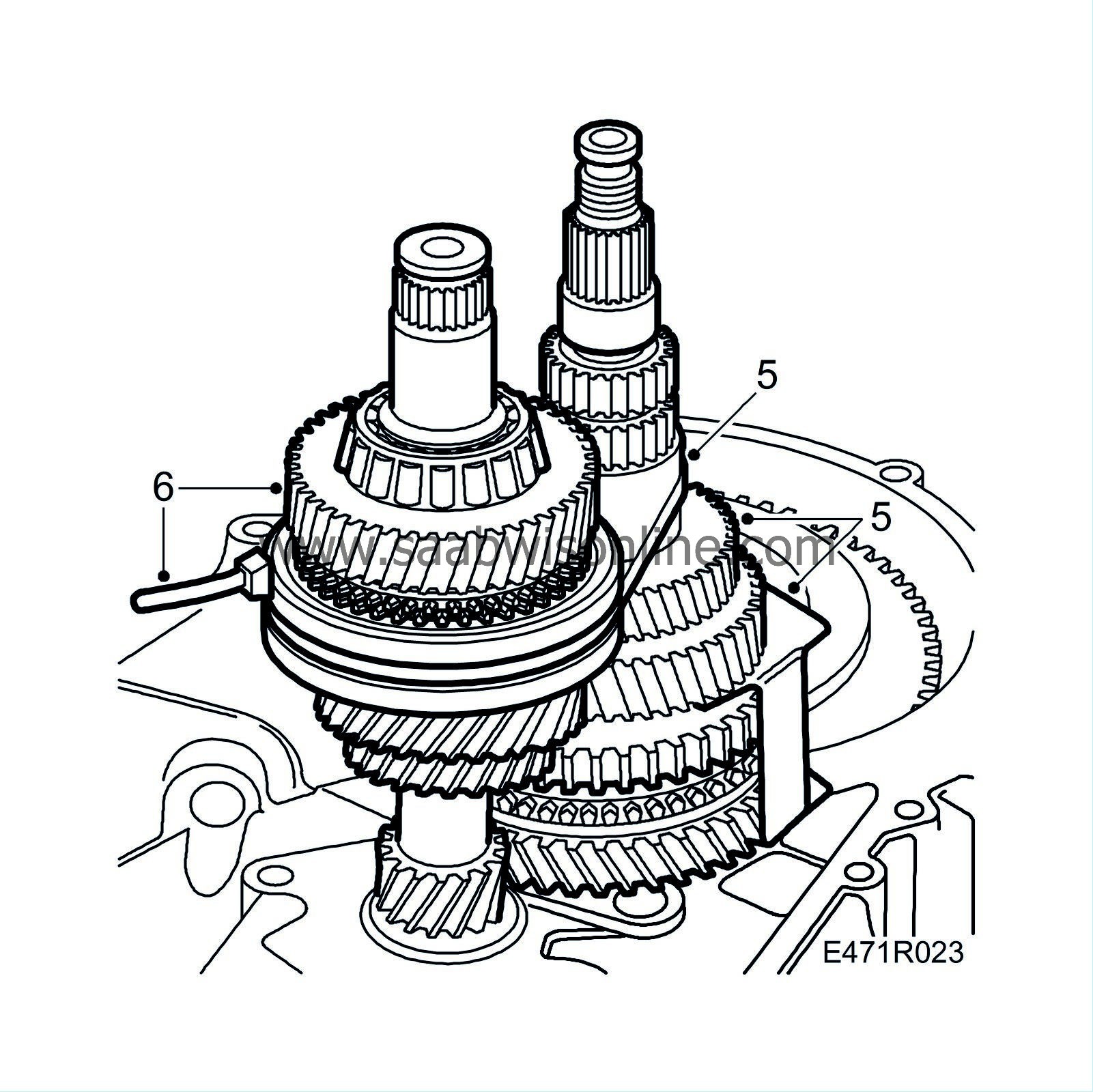
|
|
| 6. |
Place the input shaft in the housing and lubricate the bearing. Fit a cable tie to keep the gears on the input and output shafts meshed.
|
|
| 7. |
Press down the gear on the output shaft on the face of the clutch housing. Carefully tap with a hammer,
87 91 204 Sleeve, bearing race
and
87 90 867 Assembly ring, input shaft bearing
until a
new clamping sleeve
(paired with spacer sleeve) and the 4th gear can be fitted. Turn the 4th gear with the
machined groove down.
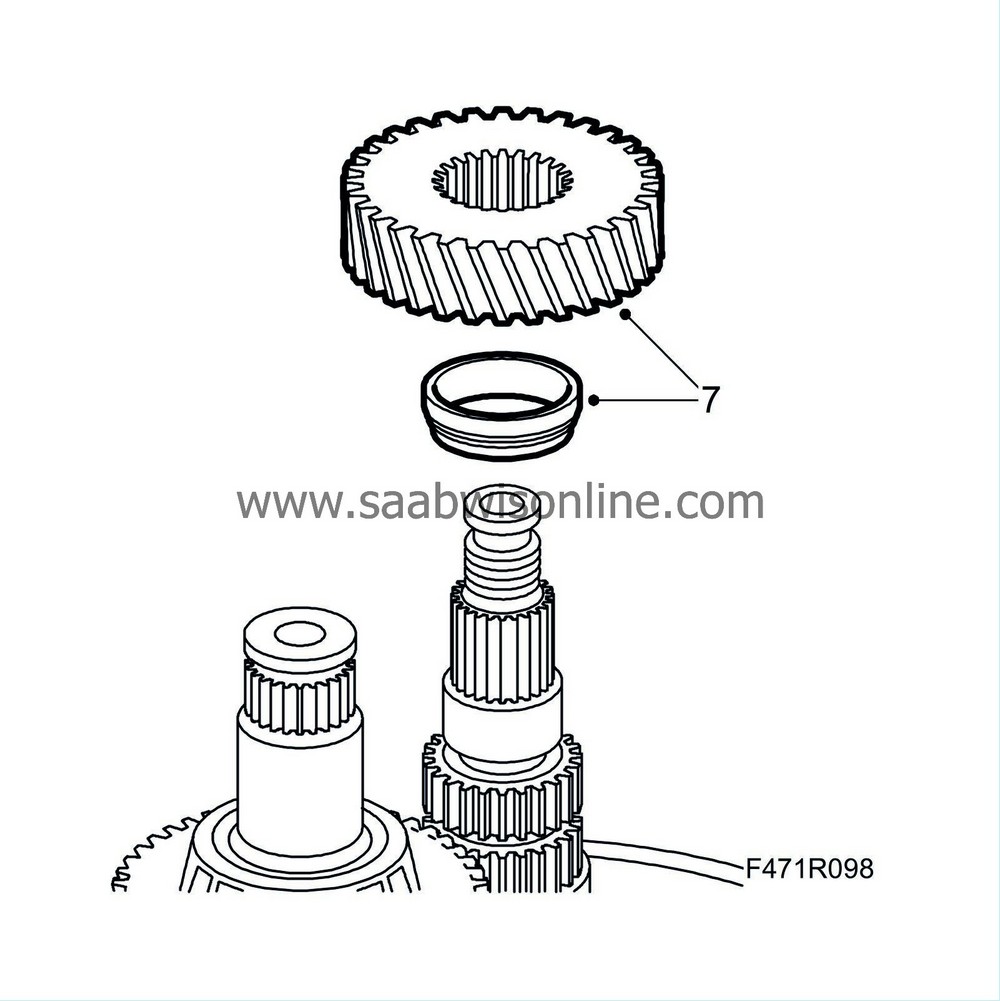
|
|
| 8. |
Fit
87 91 261 Puller, pinion
and pull until the 4th gear pinions and gear wheels on the input and output shafts are flush with each other. Cut off the cable ties and remove
87 92 103 Assembly fixture, 1
. Check that 1st and 2nd gear pinions run easily on the output shaft.
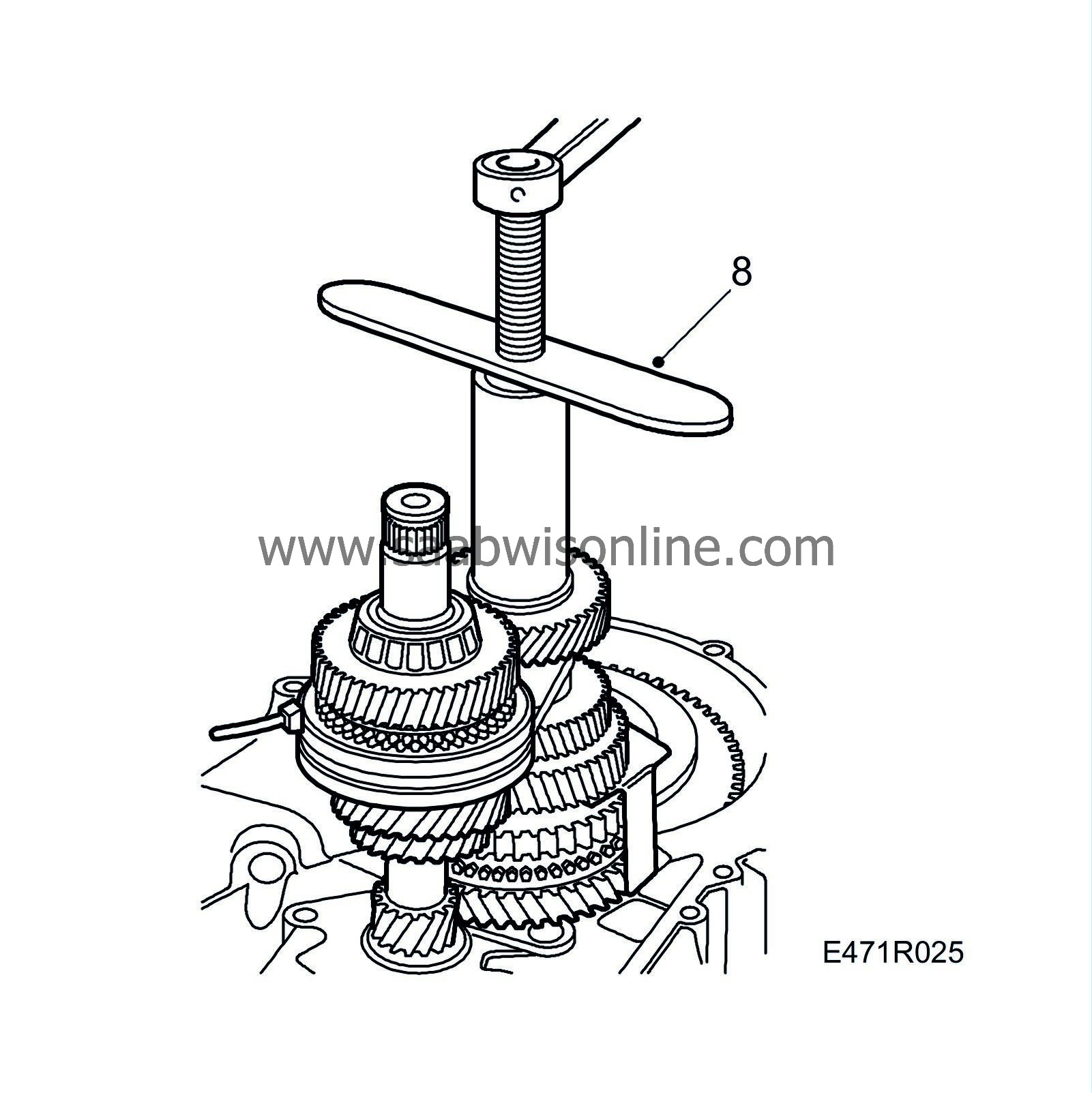
|
|
| 10. |
Fit the gear-changing mechanism and clutch housing. The forks should be in neutral position. Fit the preload washer.
|
|
| 11. |
Place the 1st-2nd and 3rd-4th forks in the synchromesh sleeves and turn and push the mechanism into position. The synchromesh sleeves should be in the neutral position. Insert the locating sleeves and align the screws.
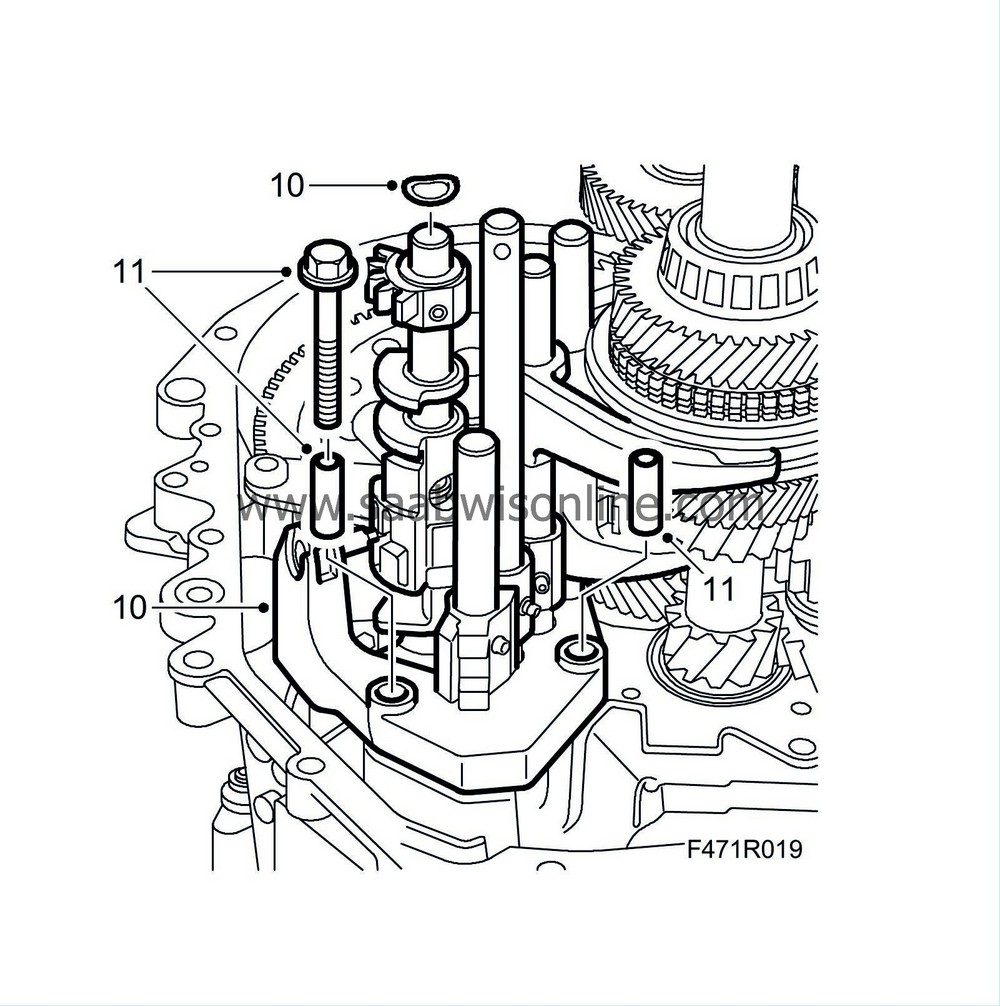
|
|
| 12. |
Fit the reverse lever with the two remaining screws. Tighten the 3 screws.
Tightening torque 24 Nm (18 lbf ft) 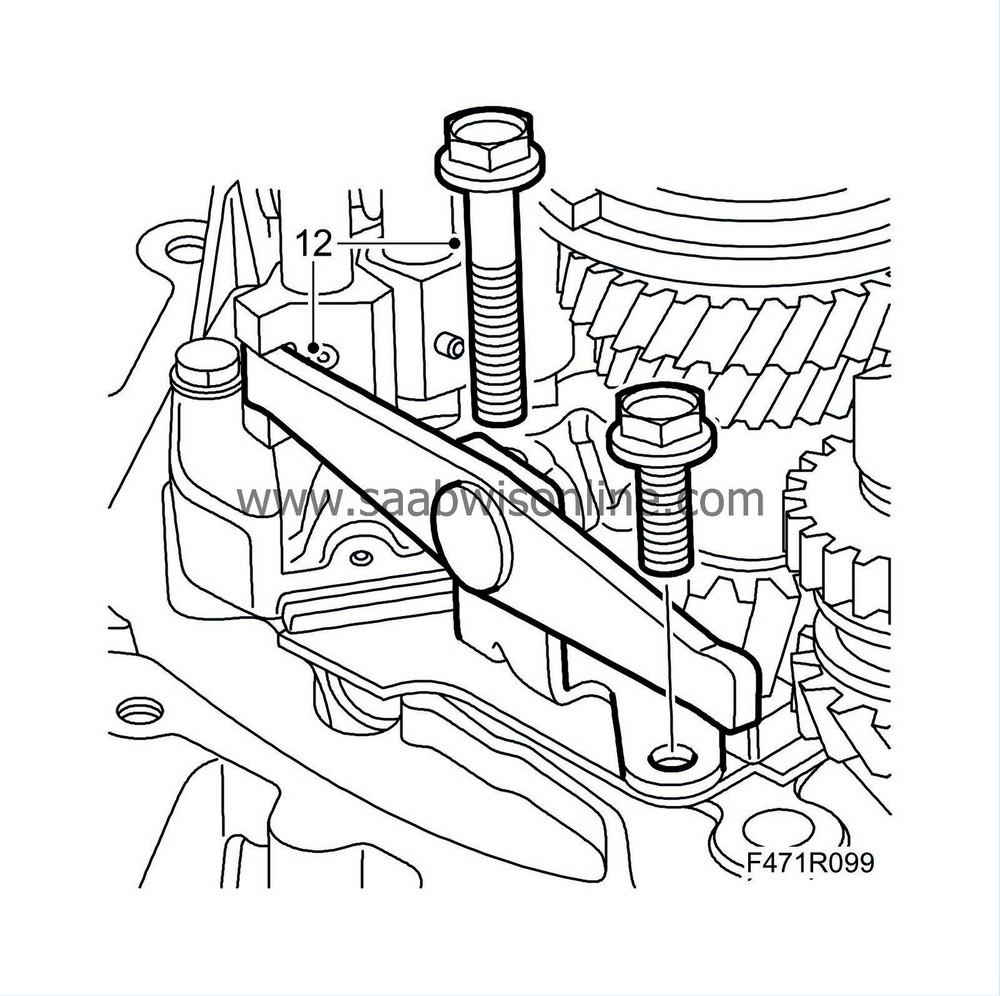
|
||||||||||
| 13. |
Fit the fork onto the reverse synchromesh sleeve. Make sure the reverse lever engages with the reverse fork groove. Then push in the shaft.
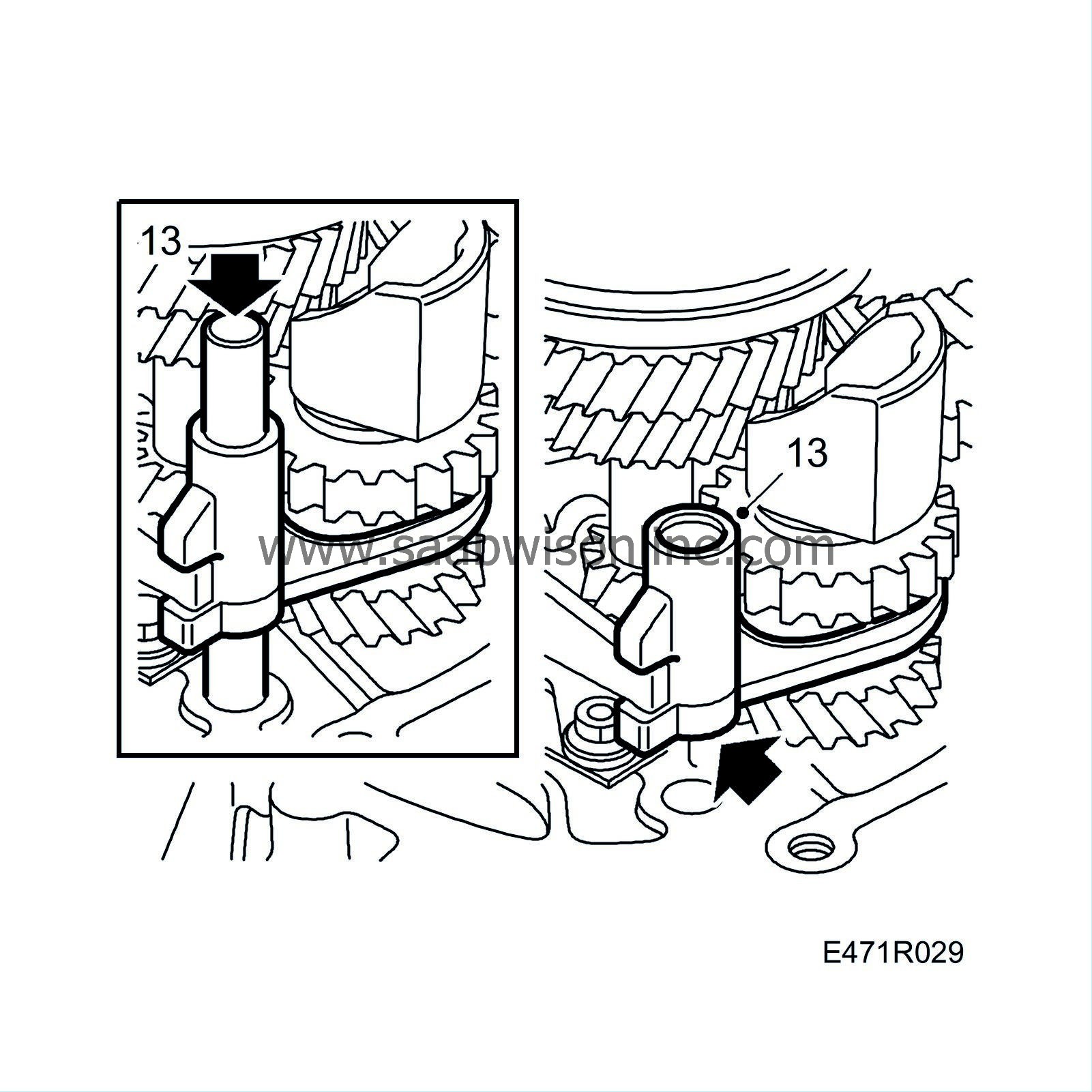
|
|
| 14. |
Engage reverse with the gear changing mechanism and make sure it is engaged properly.
|
|
| 15. |
Clean the sealing surfaces thoroughly with e.g.
Cleaning agent, Loctite Super Clean 7063
. Apply a bead about 2mm thick of
93 21 795 Flange sealant
to the clutch housing mating surface.
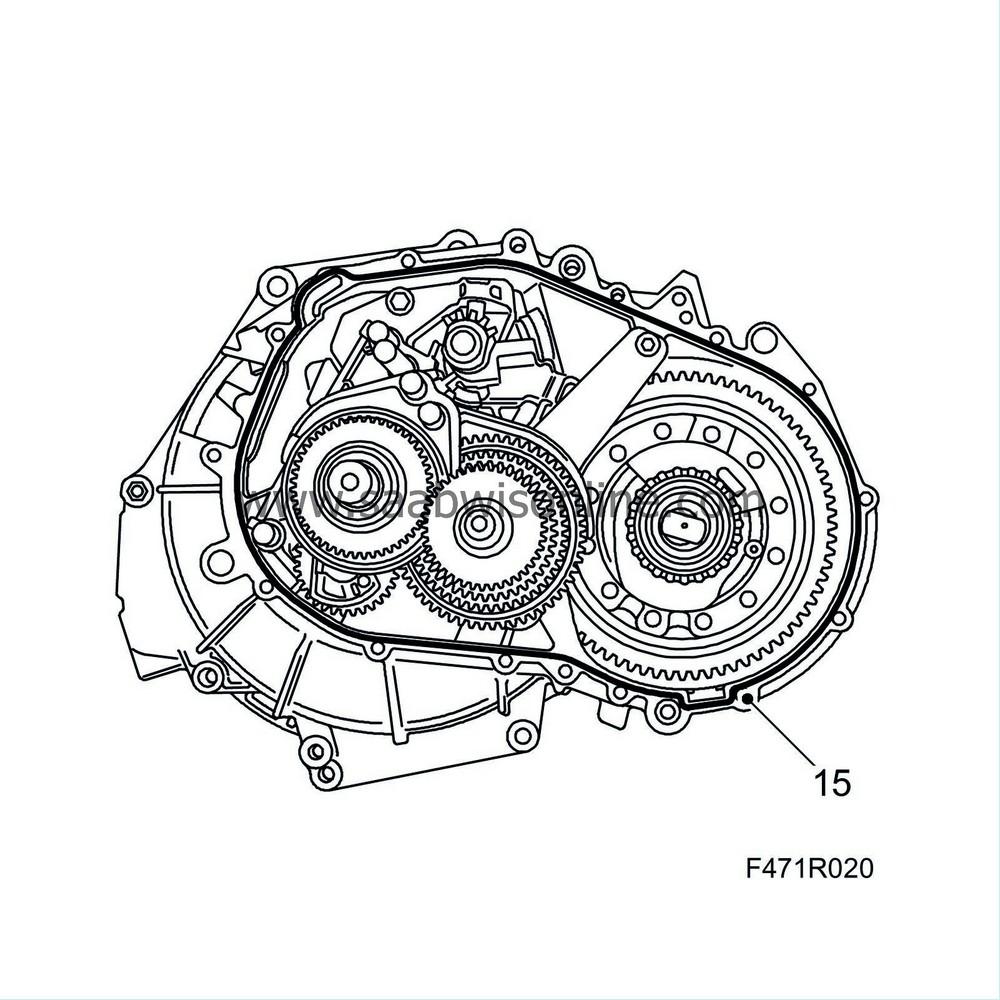
|
||||||||||
| 16. |
Make sure the reverse shaft support is positioned correctly so that the screw can be fitted after mounting the gearcase.
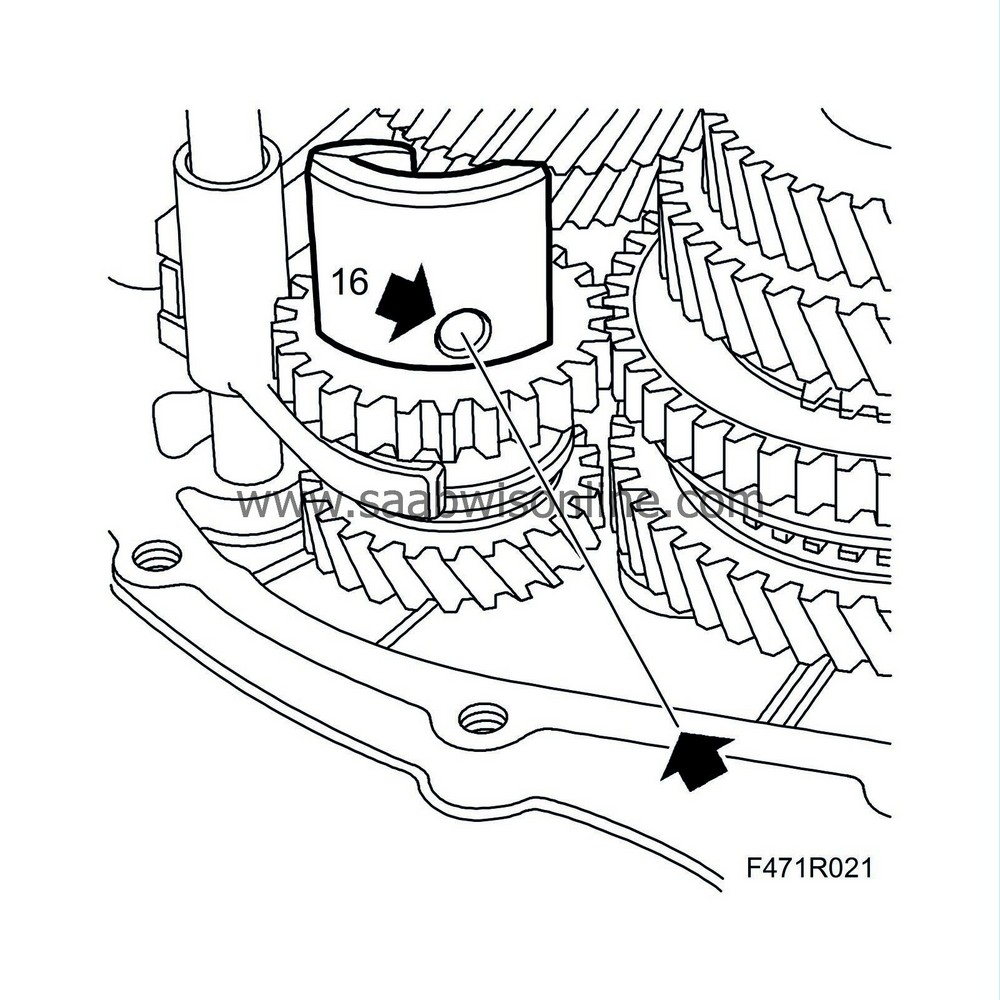
|
|
| 17. |
Place the gearcase onto the clutch housing. The mark on the gear selector arm must be aligned with the mark on the gearcase. The shift arm must be in the position must be as illustrated (17A). When the gearcase is fitted to the clutch housing and the distance between them is approx. 25 mm, turn the shift arm clockwise so that its guide roller falls into the groove (17B).
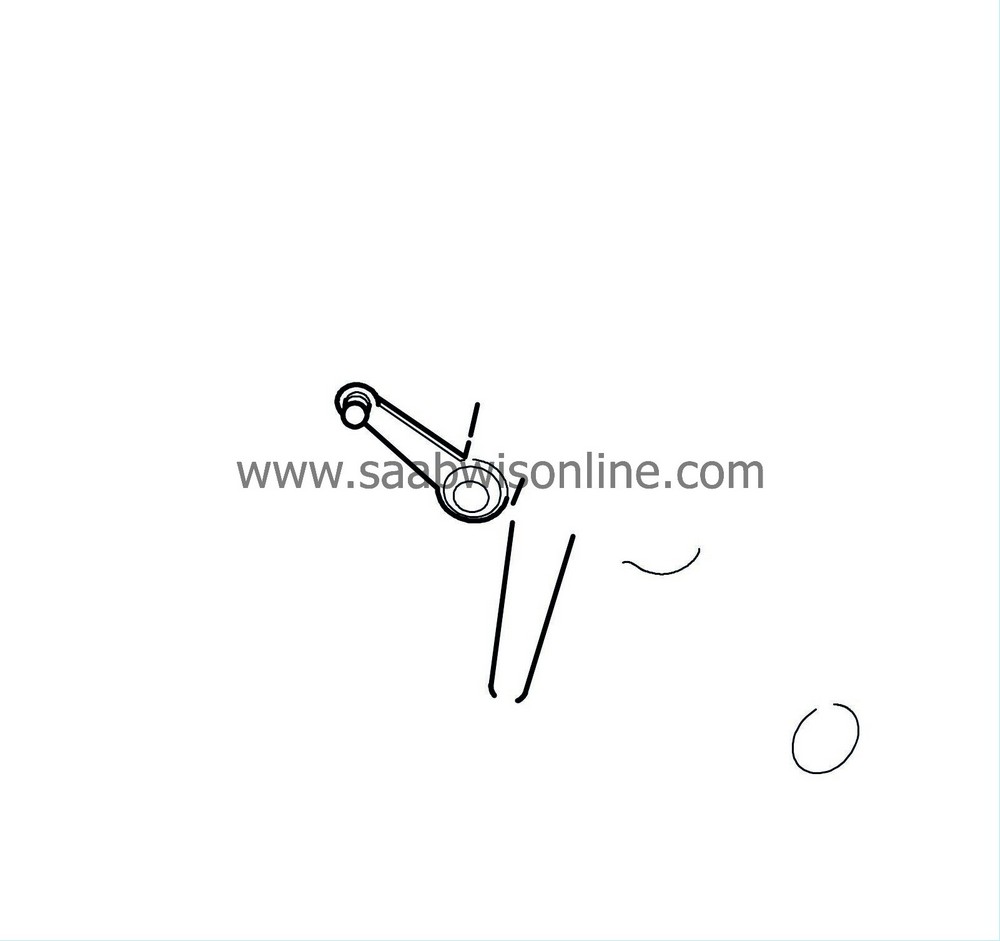
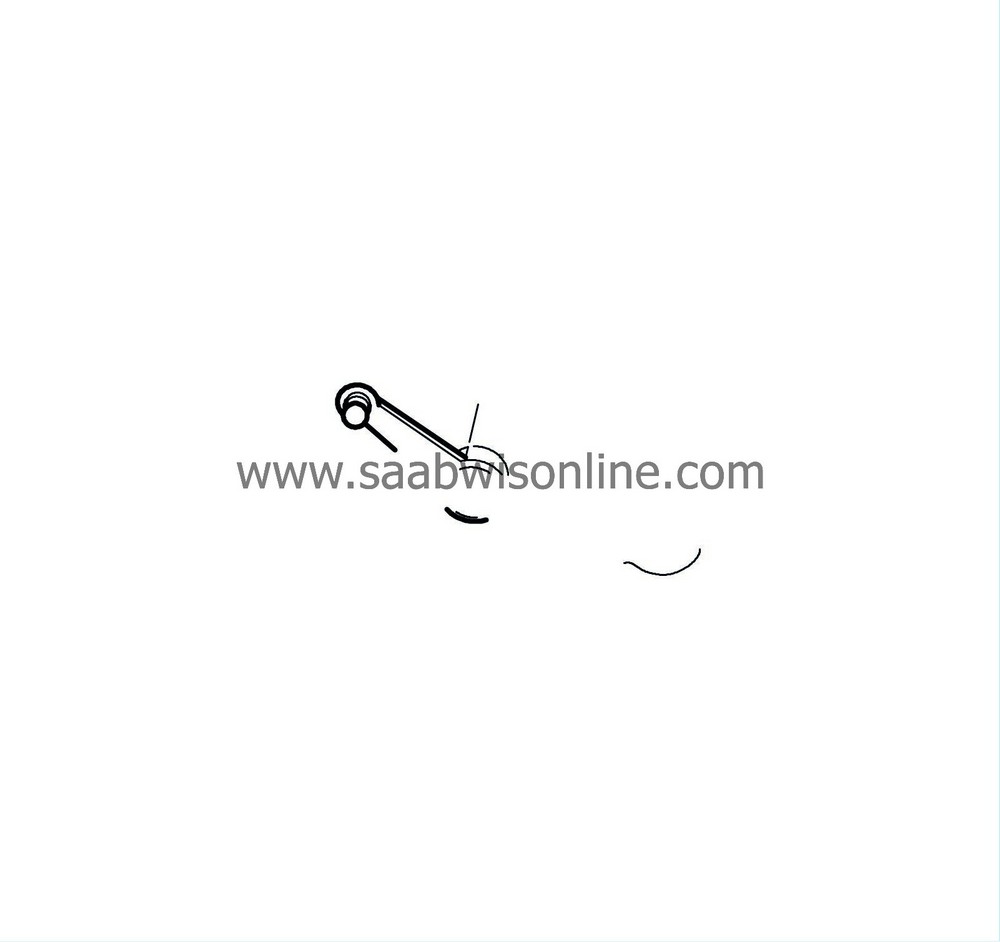
|
|
| 18. |
First secure the clutch housing and gearcase slightly using two bolts. The tap up the guide sleeves. Loosely fir the rear axle bolt. If necessary, use a small screwdriver to guide the bolt hole towards the hole in the gearcase. Fit the remaining bolts. The three lower marked bolts should be replaced with quality 10.9.
Tightening torque 24 Nm (18 lbf ft) Tightening torque, lower marked bolts (quality 10.9) 31 Nm (23 lbf ft) 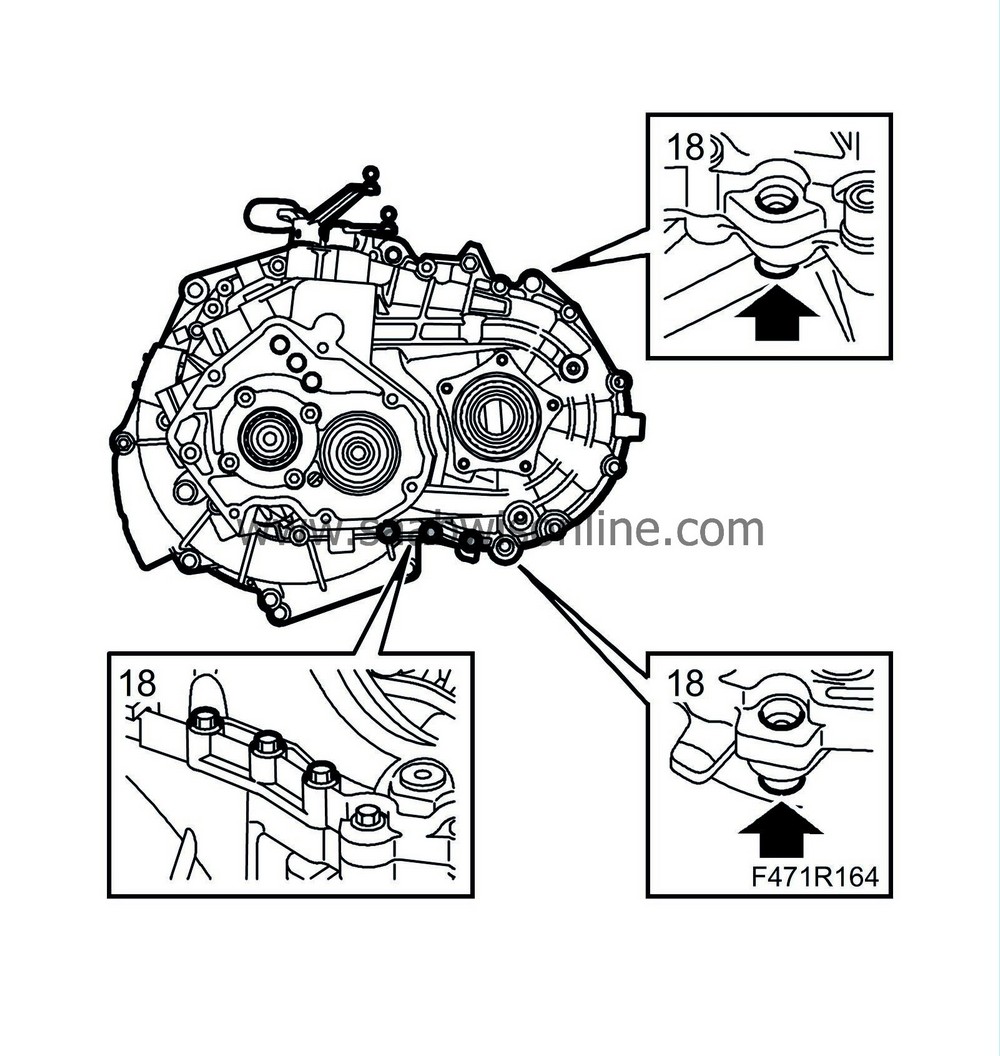
|
|
| 19. |
Tighten the screw for the reverse shaft. Note the O-ring!
Tightening torque 24 Nm (18 lbf ft) |
|
| 20. |
Tighten a new flange screw (quality 10.9) to the reverse shaft support. If there is already a 10.9 screw, it can be reused (Quality designation is stamped on the screw head).
Tightening torque, quality 8.8: 20 Nm + 120° (15 lbf ft +120°) Tightening torque, quality 10.9: 20 Nm + 45° (15 lbf ft +45°) |
|
| 21. |
Put the bearing onto the output shaft, lubricate the bearing and pull it with
87 91 261 Puller, pinion
. Pull only until the collet makes contact.
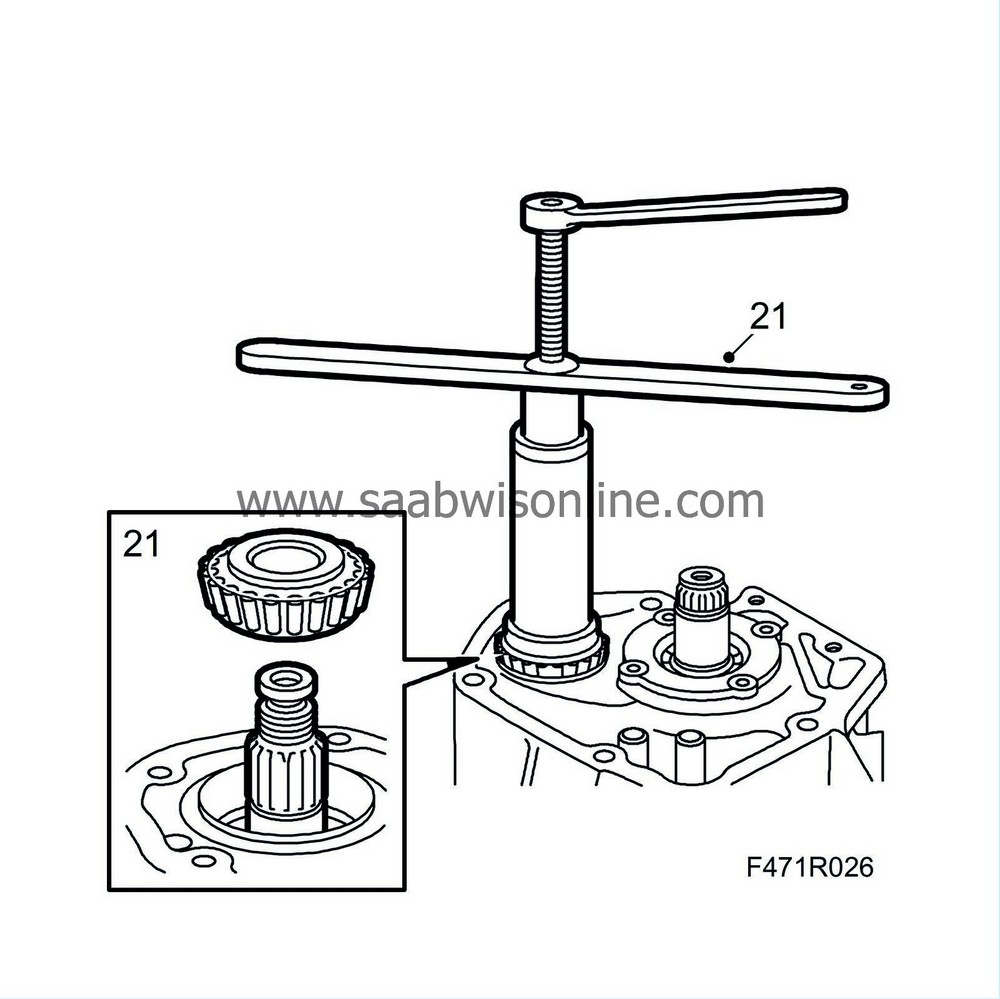
|
|
| 22. |
Put the 5th gear wheel on the output shaft. Tap down the 5th gear wheel slightly with a hammer and
78 41 067 Sleeve, inner driver bearing
. Fit
87 91 261 Puller, pinion
. Then pull the gear wheel against the bearing with the puller and fit a new nut.
|
||||||||||
| 23. |
Fit
87 91 428 Driver
onto the input shaft. Place the tip of the dial indicator on the input shaft bearing. Fit the drilling machine to the tool and "run" the gearbox to settle the bearing. Operate the drilling machine while pressing first for about 20 revolutions and then zero the dial. Operate the drilling machine while lifting it for another 20 revolutions and take a reading (or until the reading has become stable). Measure the axial play, it should be 0.09-0.15 mm. (The play will go down to 0.04-0.11 mm when the output shaft bearing has been adjusted to the correct preload.) Adjust with shims under the bearing support as necessary.

|
|
| • |
Thicker shims=increase clearance
|
| • |
Thinner shims=decrease clearance
|
| • |
Shims are available in dimensions 0.10; 0.15; 0.30 mm.
|
||||||||||
| 24. |
When adjusting axial play on input shaft:
Undo and remove the 4 screws from the bearing support. Refit the bearing support together with the correct package of shims and tighten alternately. Tightening torque 38 Nm (28 lbf ft)Check play again. Remove the three tools. |
|
| 25. |
Fit
87 92 772 Holding tool, input shaft
B207)
or
87 92 517 Holding tool, input shaft
(D223L)
to support the input shaft when the 5th gear synchromesh nub is tapped down.
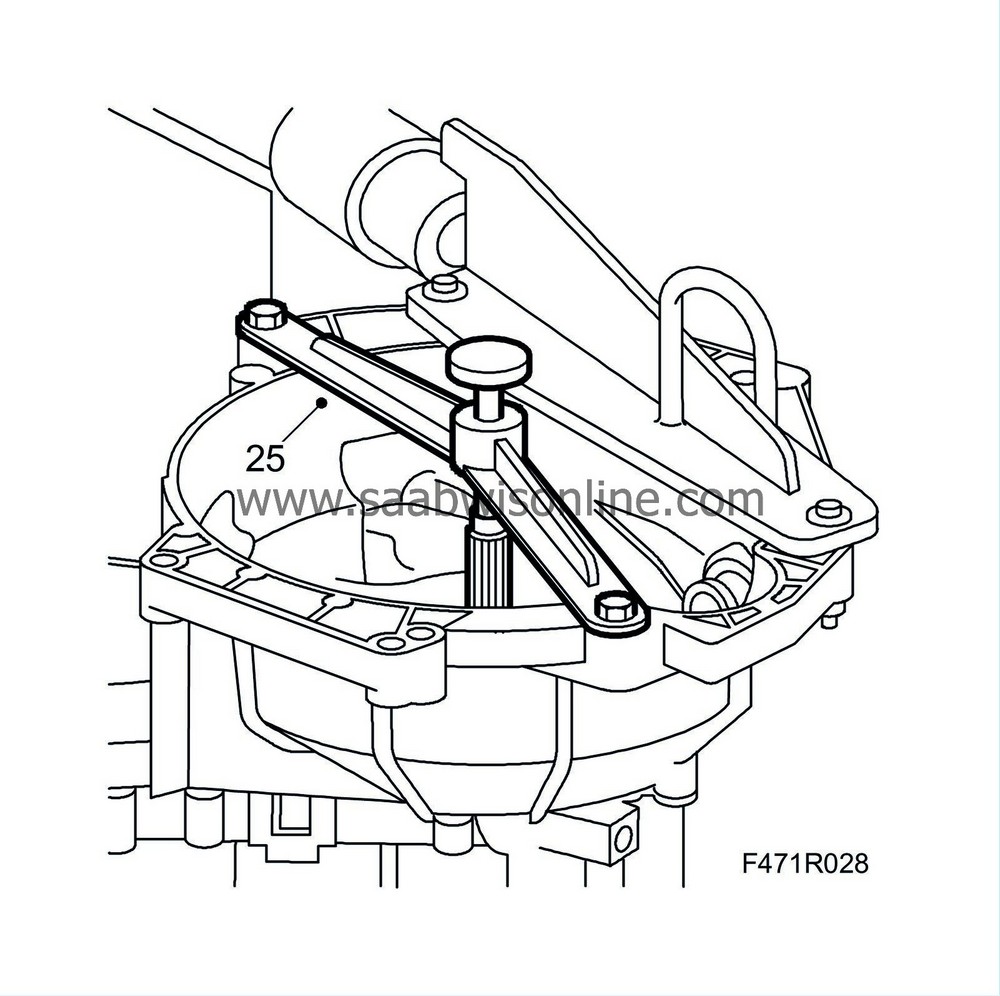
|
|
| 26. |
Fit the 5th pinion with needle bearing. Lubricate the bearing.
|
|
| 27. |
Assemble the wire ring, the 3 leaf springs, the baulk ring and the hub with
87 92 582 Fixture, 5
. Tap down the hub with
78 41 067 Sleeve, inner driver bearing
onto the input shaft spline.
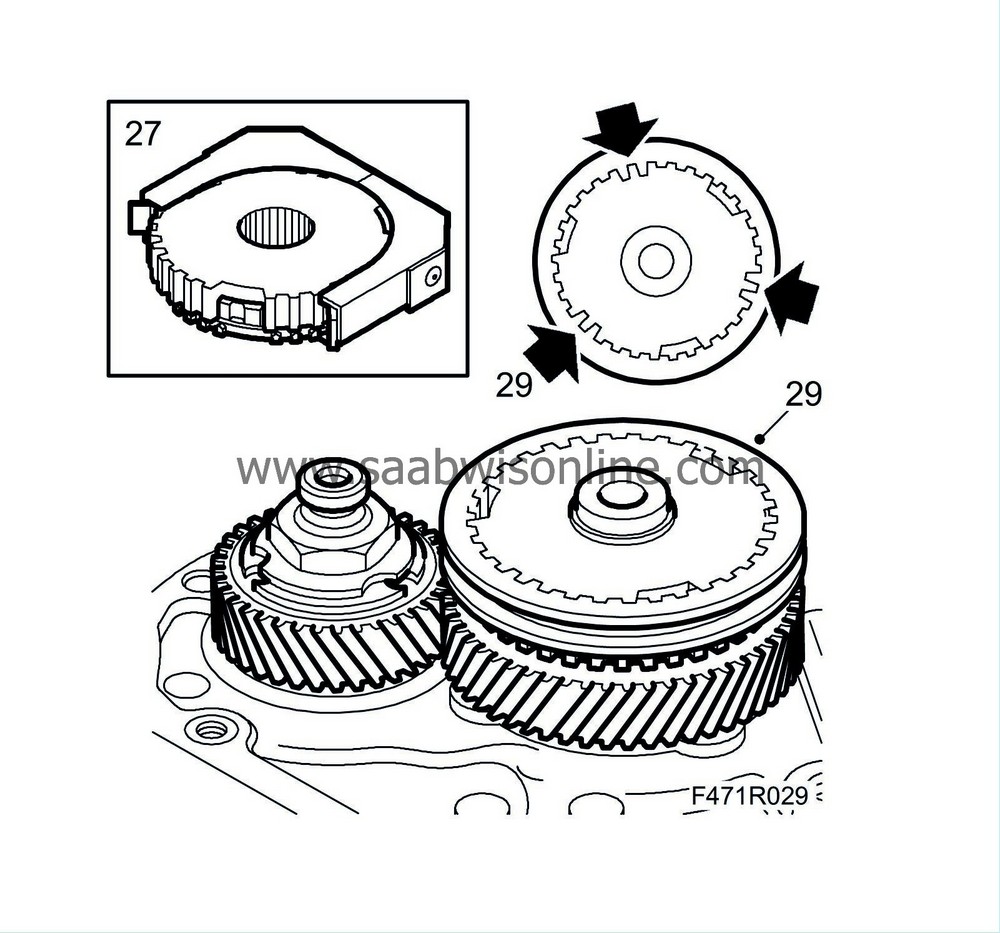
|
|
| 28. |
Remove
87 92 582 Fixture
.
|
|
| 29. |
Fit the 5th synchromesh sleeve with the tip angles down.
The 6 stop lugs on the synchromesh sleeve must mesh with the 6 deep tooth gaps in the synchromesh hub . |
|
| 30. |
Remove
87 92 772 Holding tool, input shaft
.
|
|
| 31. |
Fit
87 92 194 Dial gauge kit
against the gear wheel with
87 90 727 Bracket, dial gauge
. Engage 1st gear (see illustration) and press down the 5th gear synchromesh hub to "lock" the gearbox. Tighten the nut and measure alternately with the dial gauge until an axial play of 0.06 ±0.05 mm is obtained on the output shaft. Use a short M8 bolt in the sealing face as a break point. Disengage 1st and 5th gears.
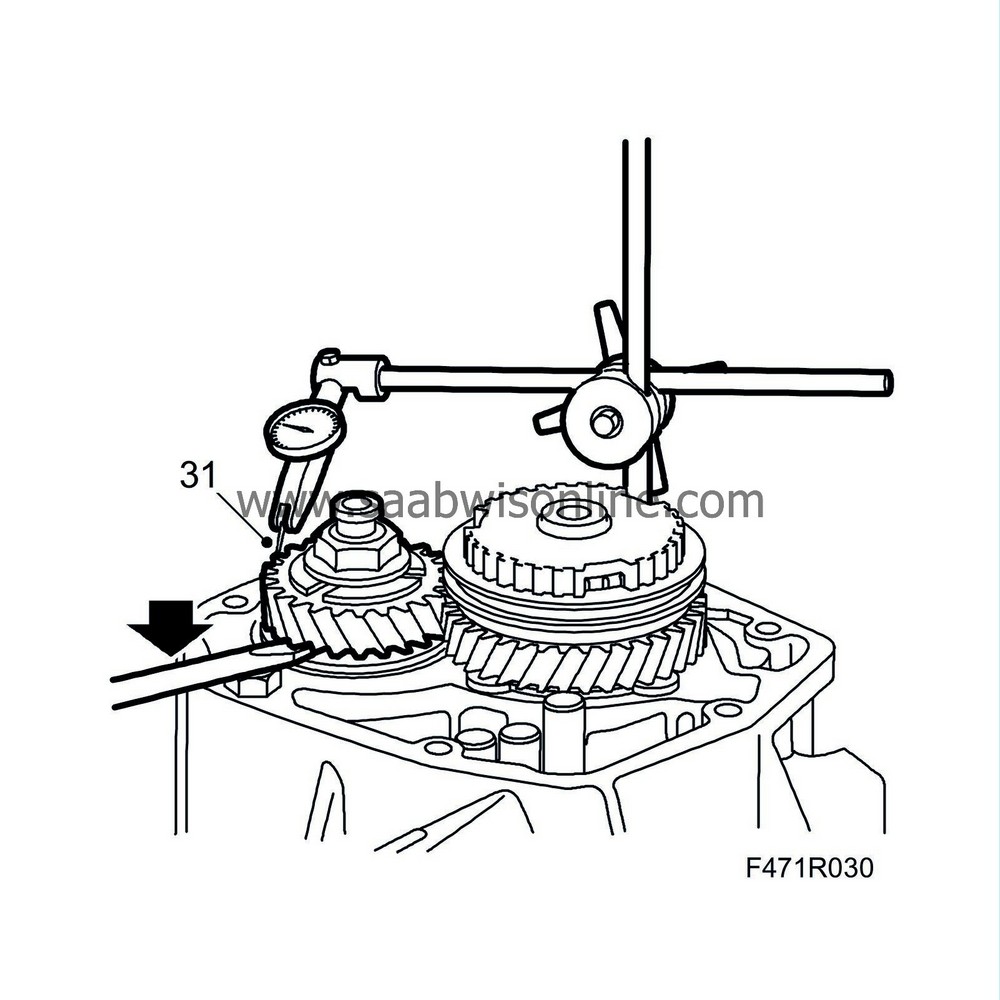
|
||||||||||
| 32. |
Check and adjust the preload of the differential as follows:
Thread in the bearing race (not all the way in) and fit the bearing support without O-ring, shaft seal and shim. Tighten 4 screws. Tightening torque 24 Nm (18 lbf ft)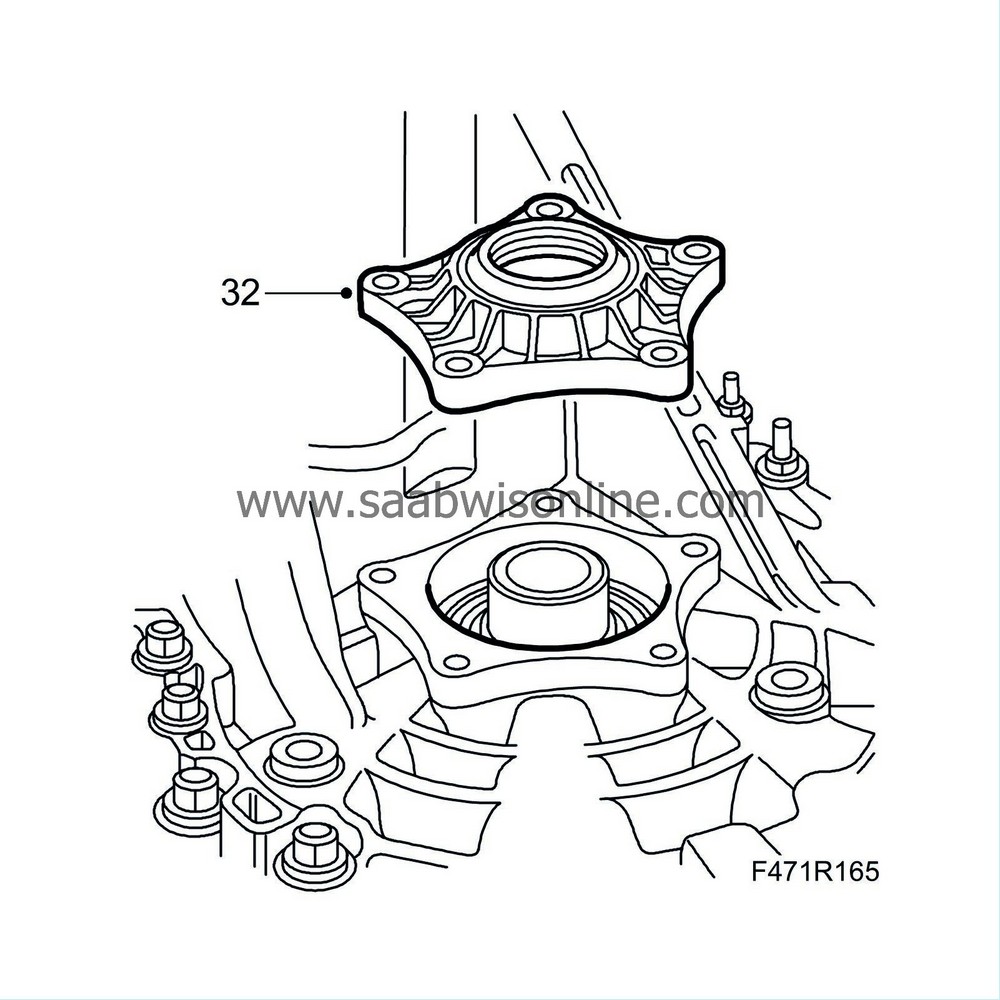
|
|
| 33. |
Fit
87 90 727 Bracket, dial gauge
with
87 92 194 Dial gauge kit
in the available hole. Set the tip against the differential housing. Run the output shaft with a drill and
87 92 053 Driver
until the value on the dial gauge has stabilised. Reset the dial gauge.
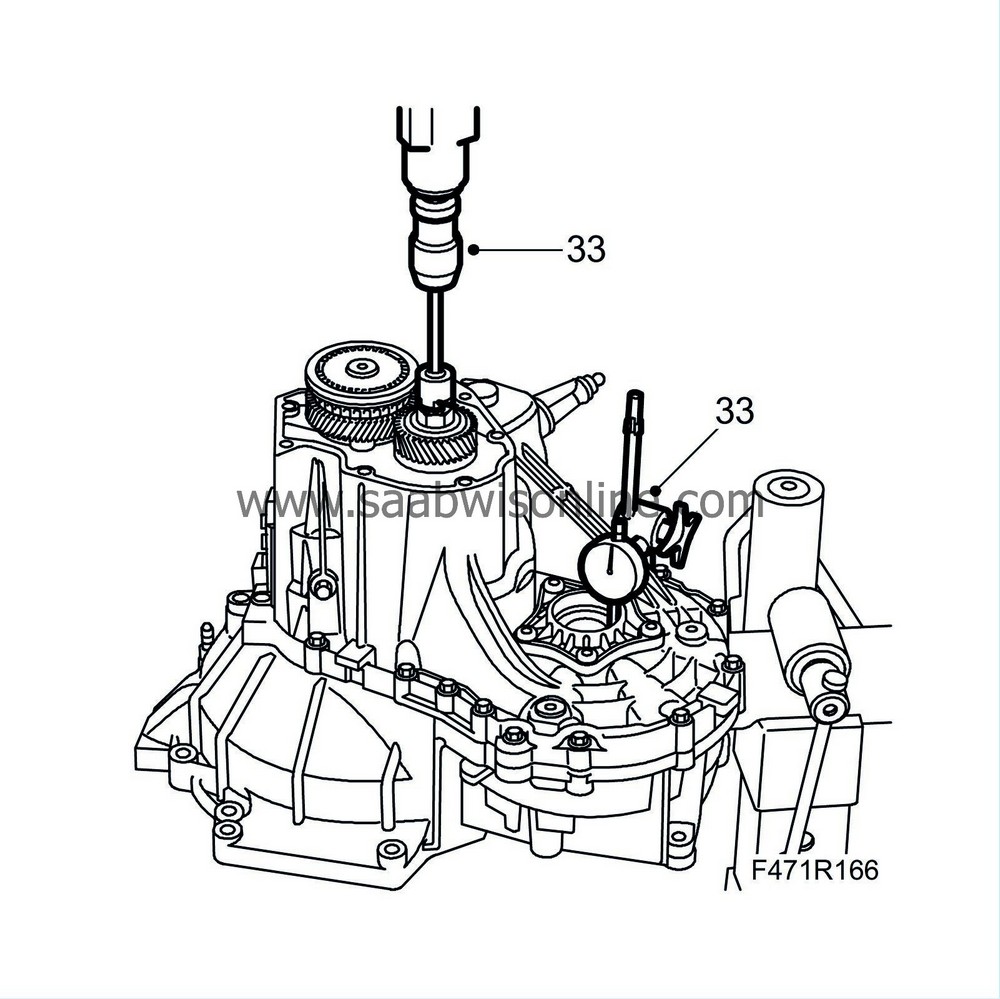
|
|||||||||
| 34. |
Lift the differential using
87 91 337 Drive, measuring differential bearing torque
and read the value on the dial gauge.
The correct shim thickness is: measured value plus the value from the table. 
|
|||||||||
| • |
Thicker shims=increase preload
|
| • |
Thinner shims=reduce preload
|
| • |
Shims for the differential are available in sizes 0.10, 0.15, 0.30, 0.50 mm
|
| 35. |
Remove the dial gauge, stand and bearing support. Fit and lubricate the O-ring on the bearing support. Fit the bearing support with the measured shims. Tighten the bearing support until a little bearing play remains so as not to affect bearing preload adjustment on the output shaft. The bearing support is tightened more later.
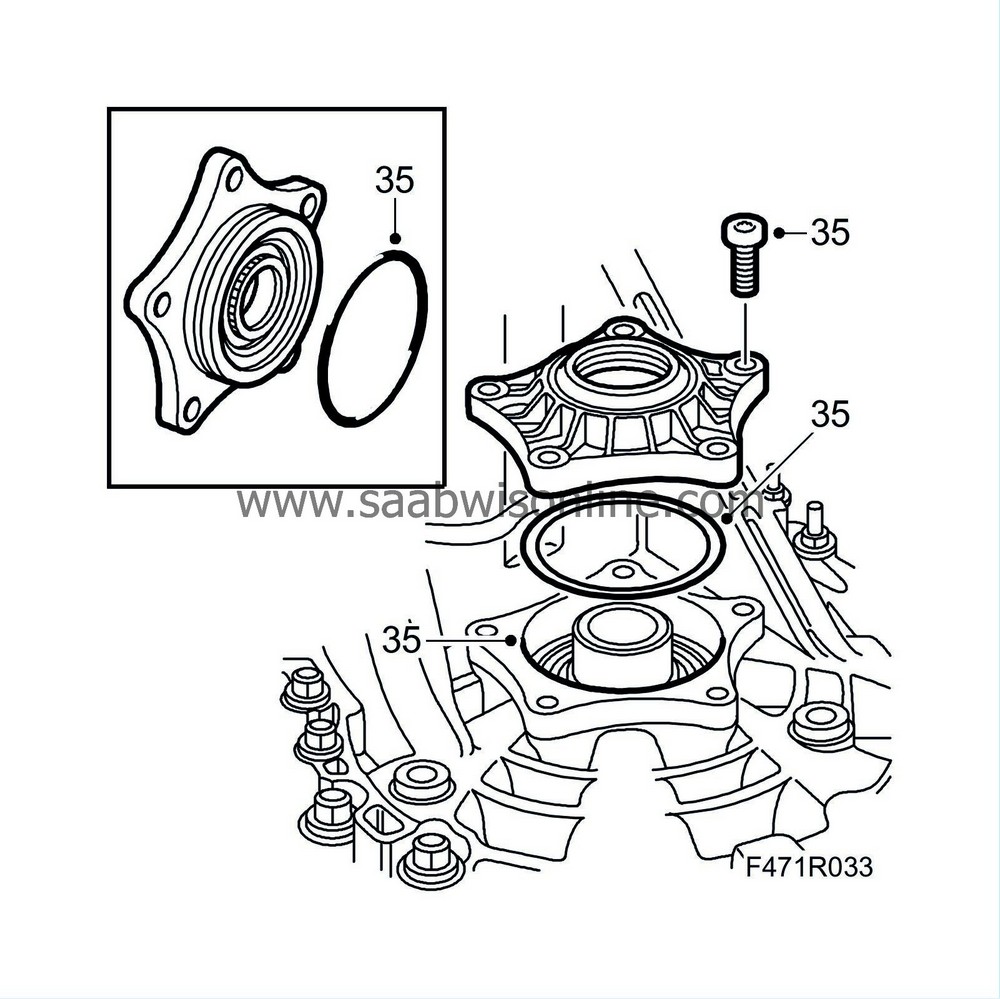
|
|
| 36. |
Turn the gearbox so that it is in the same position as it would be in the car, i.e. horizontal.
|
|
| 37. |
Fit an 8 mm fuel hose (approx. 100 mm long) between
87 91 428 Driver
and a hexagon socket (M10 with 1/2" fitting). Make sure there is no gear engaged.

|
||||||||||
| 38. |
Connect the torque wrench (graduated in Nm) and rotate the wrench clockwise several revolutions at even speed. Read off the average value while rotating, normally 0.10-0.30 Nm.
If the value is higher than 0.30 Nm or if it varies greatly during rotation then the baulk rings are braking or there is dirt or cuttings in the bearing. Dismantle the gearbox and find the cause. It may help to rotate the shaft mechanically to and fro under an axial load. The bearings must then be oiled. |
|
| 39. |
Turn the gearbox back around.
|
|
| 40. |
Place the tip of the dial gauge on the shaft as illustrated. Fit
87 92 053 Driver
to the output shaft and "run" the gearbox with the drilling machine to settle the bearing. Operate the drilling machine while pressing first for about 20 revolutions and then zero the dial. Operate the drilling machine while lifting it for another 20 revolutions and take a reading (or until the reading has become stable). Remove the tool.
Note the axial play reading and then add the nominal value
. Remove the dial gauge.
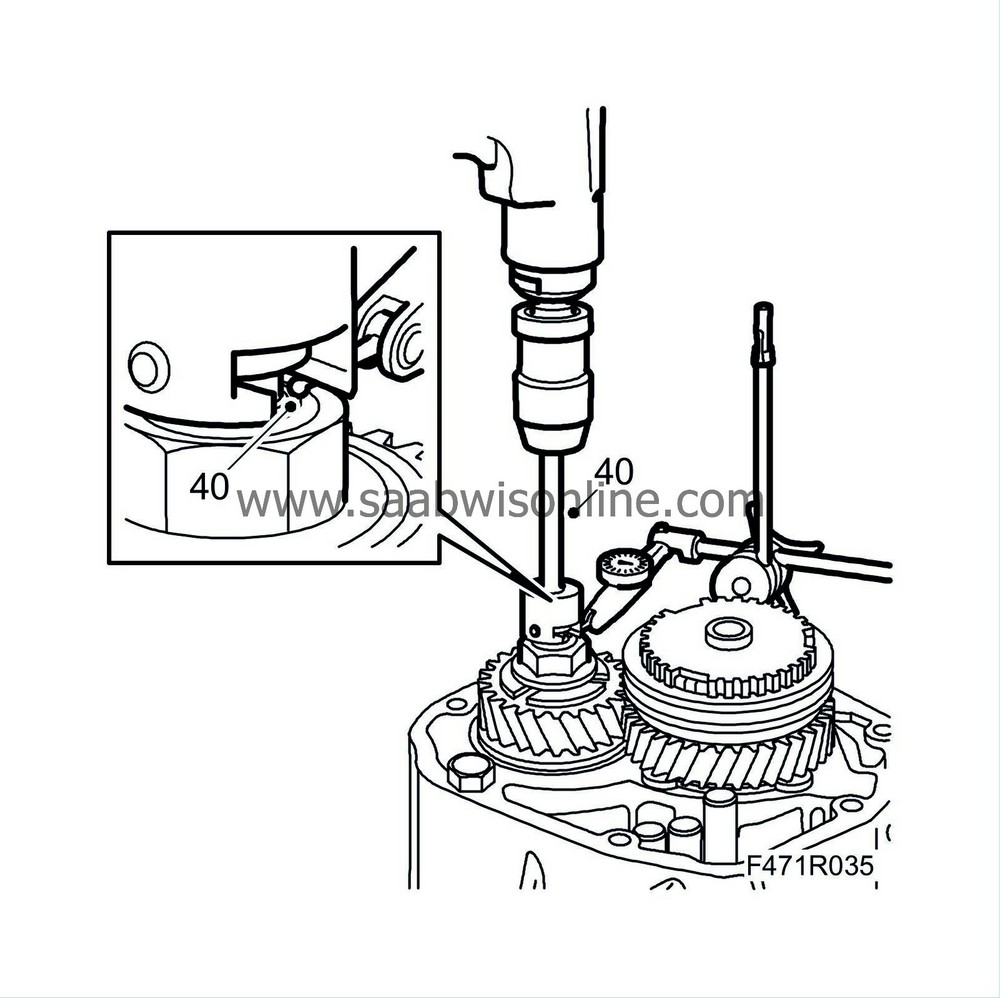
|
|||||||||
| 41. |
Engage 5th gear by pushing down the synchromesh sleeve. Engage 1st gear.
|
|
| 42. |
Remove
87 92 053 Driver
from the output shaft.
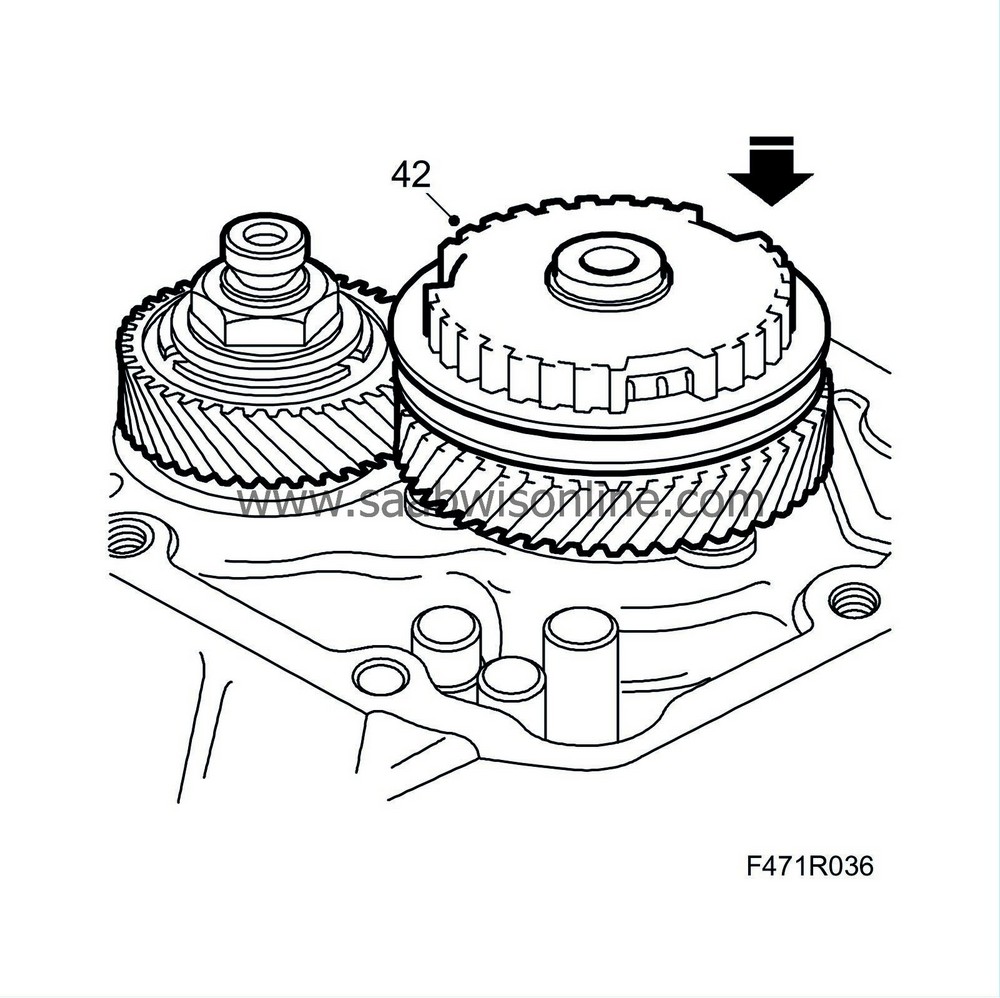
|
|
| 43. |
Fit
87 92 061 Millimetre wheel, 27 mm
to the output shaft nut. Set the calculated value (measured + nominal, see example) on the scale of the tool (mm-wheel). Mark one tooth of the gear wheel with felt tip pen or similar. Each graduation corresponds to 0.01 mm.
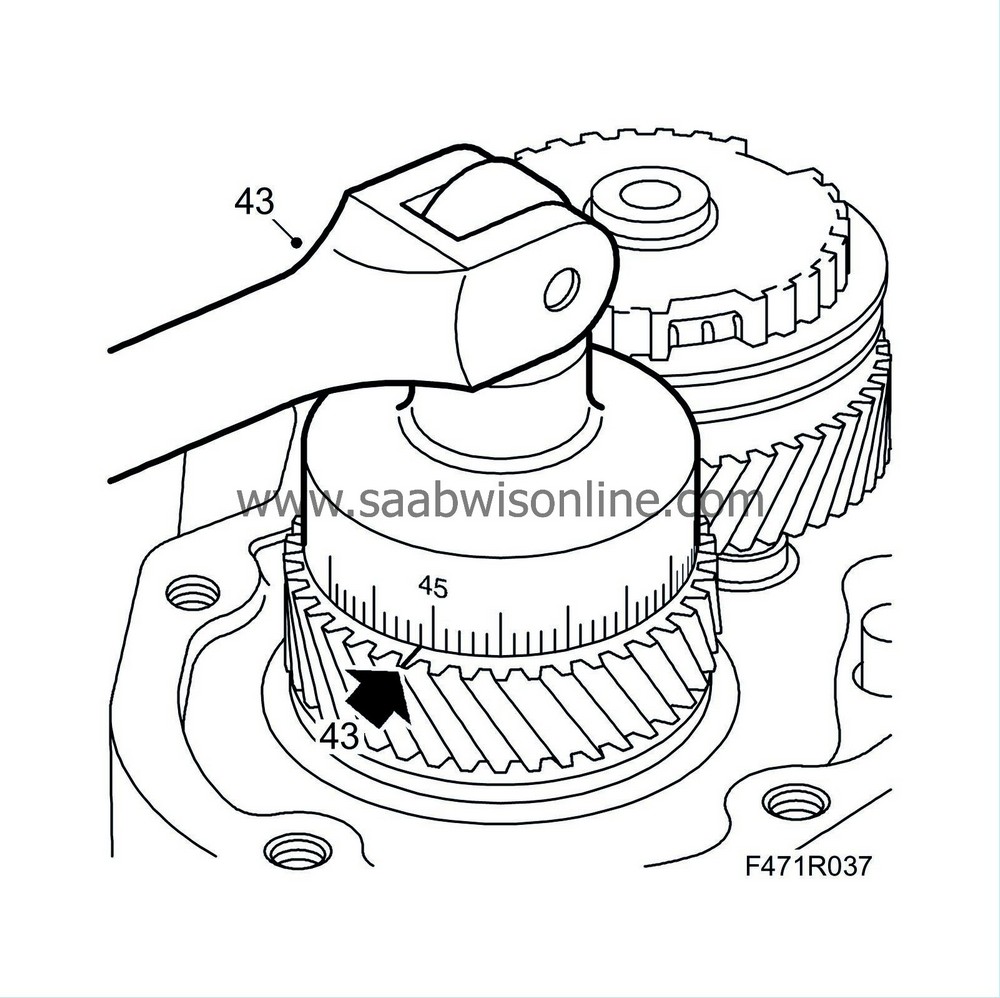
Example: Measured value 0.43 + 0.03 (nominal value, over 5,000 km) = 0.46 mm Check the rolling torque on new bearings only |
|||||||
| 44. |
Tighten in 2-3 stages until the zero graduation (0) of the tool (mm-wheel) reaches the marked tooth. Measure the axial play again as described in steps 40-44 to ensure the correct preload. Remove the tool and sleeve.
If an old bearing has been fitted to the output shaft, lock the nut and proceed to step 51. If a new lager has been fitted, do not lock the nut and continue with the next step. 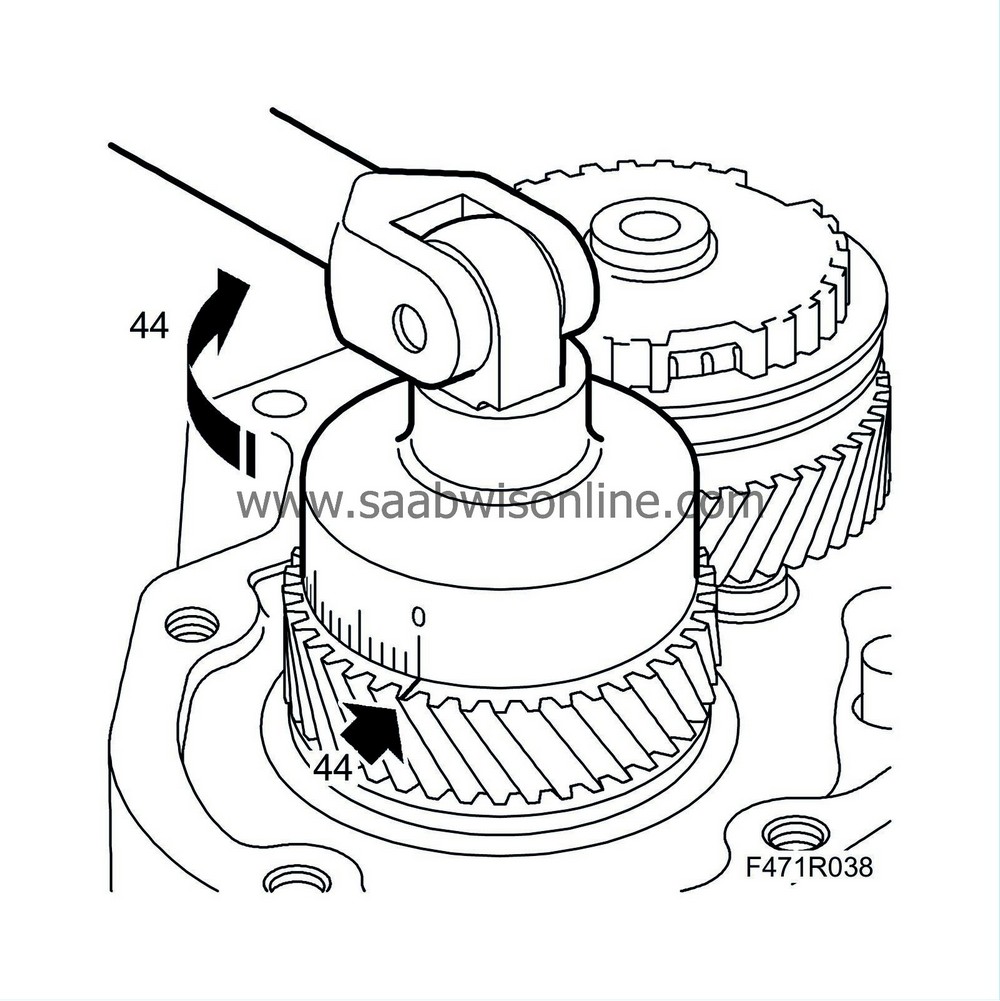
|
|
| 45. |
Before taking a more precise measurement of the output shaft bearing preload, the following must be complied with:
Input shaft bearing (axial play 0.09 - 0.15 mm) Differential, bearing support fitted but not tightened (axial clearance 0.10 - 0.20 mm) All bearings oiled |
|
| 46. |
Turn the gearbox so that it is in the same position as it would be in the car, i.e. horizontal. Disengage 1st gear and lift off the 5th synchromesh sleeve.
|
|
| 47. |
Place the torque wrench at the 5th gear nut output shaft. No gear must be engaged. Rotate the torque wrench several turns clockwise at an even speed. Read the average value from the display during rotation.
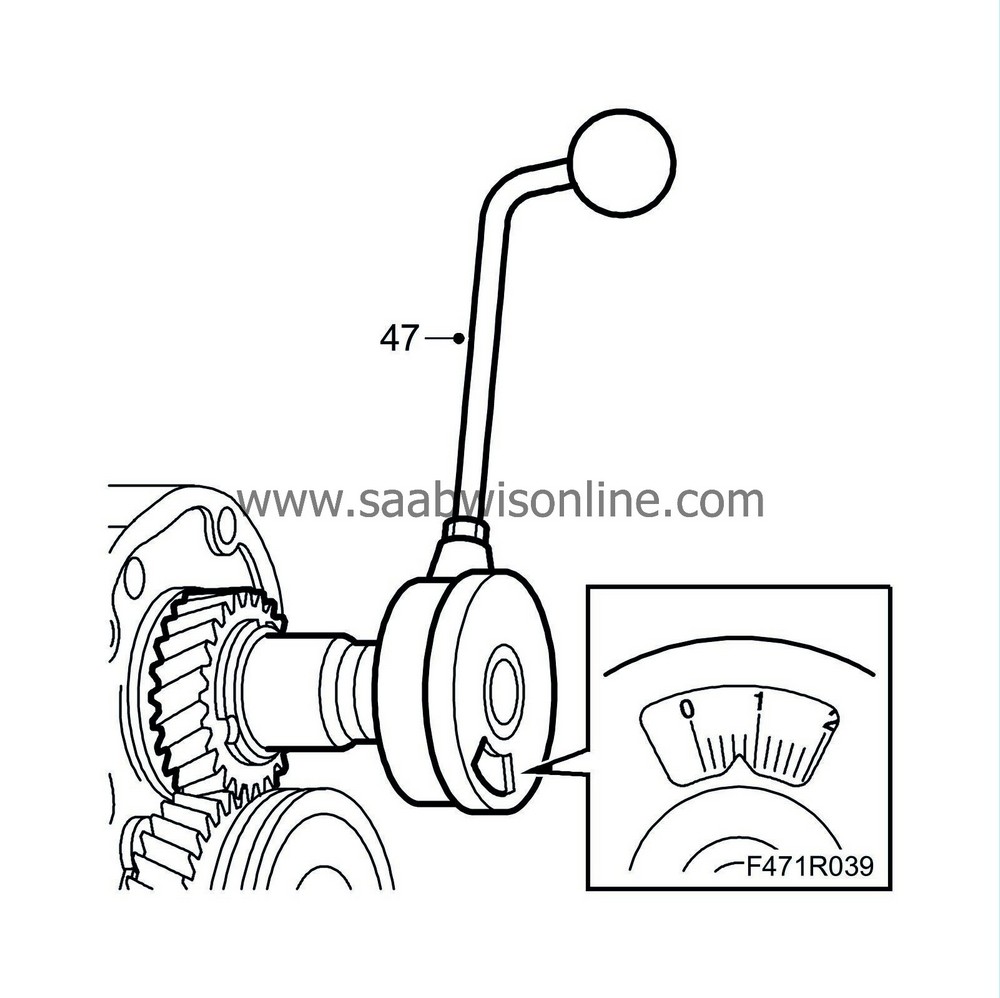
|
|
| 48. |
The reading should be 0.5 - 1.0 Nm.
Tighten the output shaft (5th and 1st engaged) two graduations on the millimetre marking of 87 92 061 Millimetre wheel, 27 mm at a time until the correct rolling torque (0.5 - 1.0 Nm) is obtained. Average torque varies greatly : Cause: Retarding baulk rings, swarf or dirt in the bearings. Action: Dismantle the gearbox. Average torque higher than 1.0 Nm: Cause: Same as above or bearings too tight Action: Dismantle the gearbox and change clamping sleeve. The bearings should then be preloaded and checked. |
|
| 49. |
Lock the nut on the output shaft.
|
|
| 50. |
Turn the gearbox back around.
|
|
| 51. |
Lift off the 5th synchromesh sleeve and fit the 5th fork to the 5th synchromesh sleeve. Fit the fork and sleeve to the shaft.
The 6 stop lugs on the synchromesh sleeve must mesh with the 6 deep tooth gaps in the synchromesh hub . 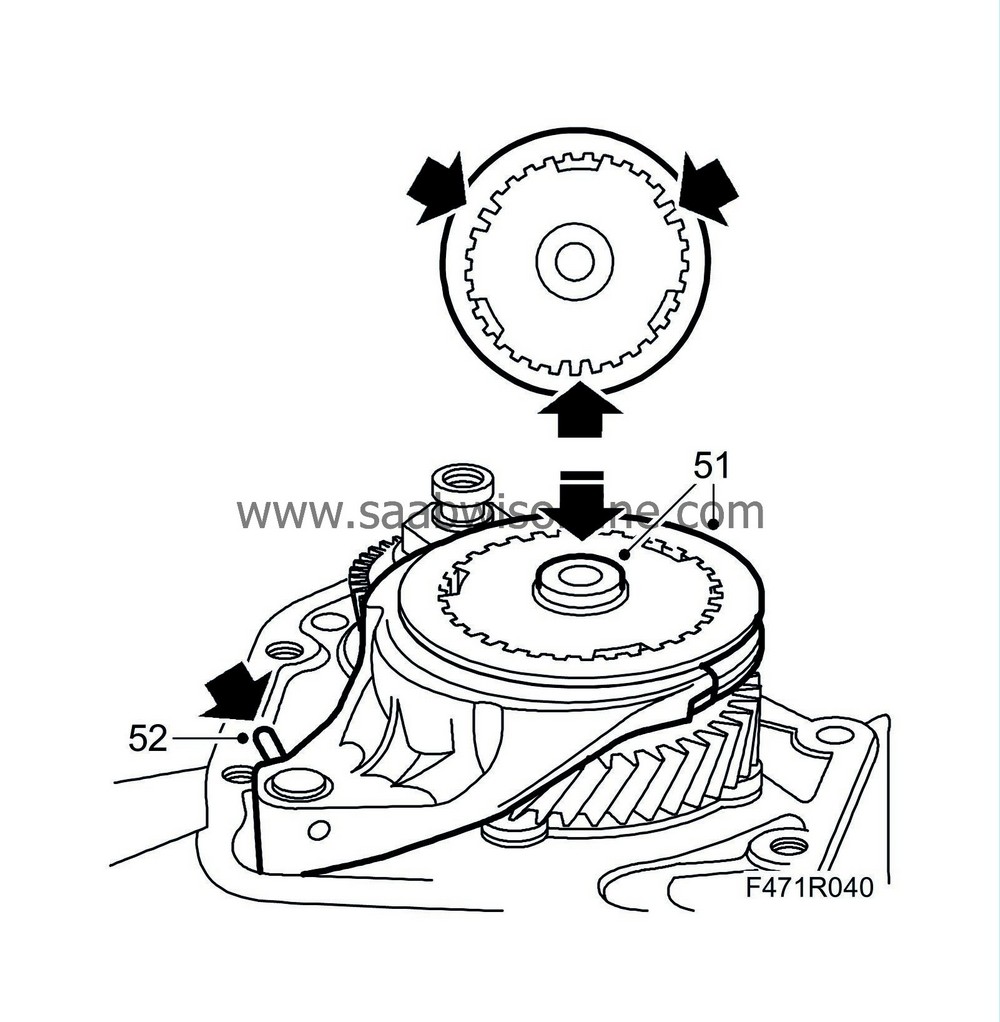
|
||||||||||
| 52. |
Tap the retention pin into the selector shaft.
|
|
| 53. |
Fit a new circlip.
|
|
| 54. |
Tighten the screws for the differential bearing support.
Tightening torque 24 Nm (18 lbf ft) |
|
| 55. |
Fit the gear cable bracket.
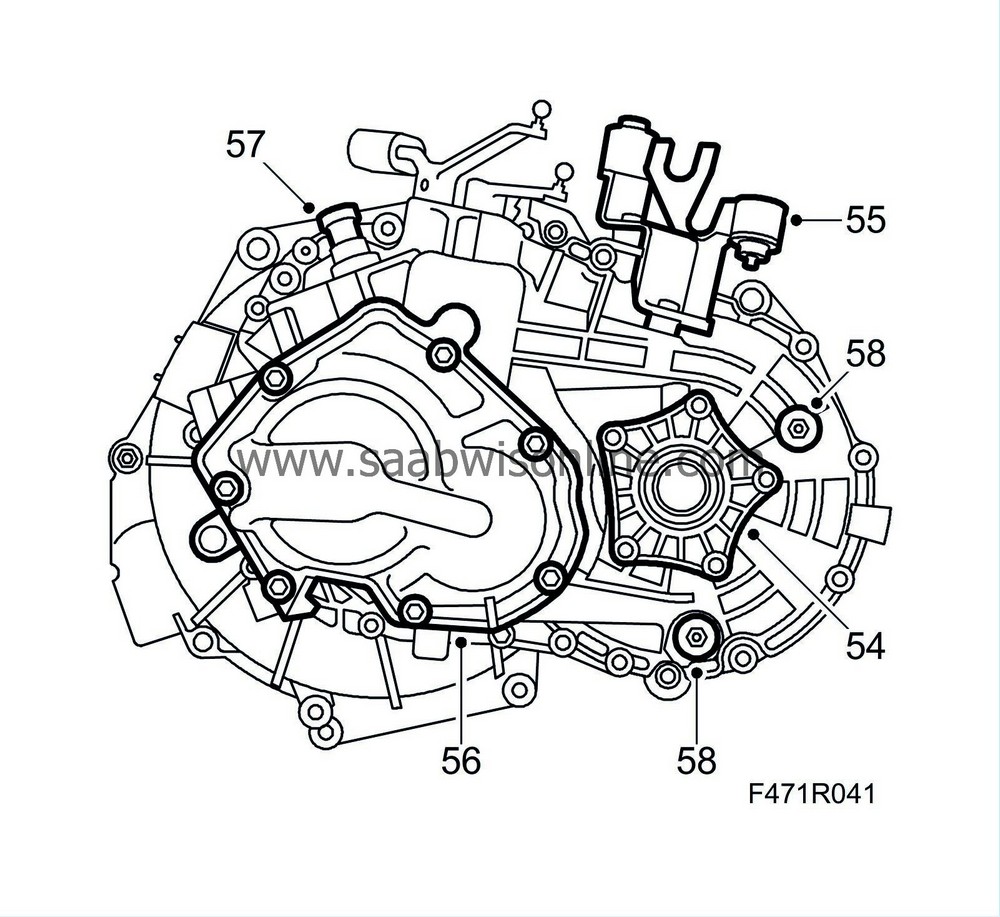
|
|
| 56. |
Put on a new gasket and fit the end cover.
Tightening torque 24 Nm (18 lbf ft) |
|
| 57. |
Refit the reversing light switch with
Thread locking adhesive, Loctite 577
if it has been removed. Wash the reversing light switch and the gearcase threads with
Cleaning agent, Loctite Super Clean 7063
.
Tightening torque 24 Nm (18 lbf ft) |
|
| 58. |
Check that the magnet is in position in the oil drain plug. Fit the plug.
Tightening torque 50 Nm (37 lbf ft) |
|
| 59. |
Fill with oil only after the drive shafts have been fitted to the gearbox and the gearbox has been fitted into the car. Oil capacity 1.9 litres, refer to
Summary of lubricants and sealants
.
|
|
| 60. |
Lubricate the sealing rings on the slave cylinder.
|
|
| 61. |
Fit the slave cylinder, use
Thread locking adhesive, Loctite 577
on the bolts.
Tightening torque 10 Nm (7 lbf ft) 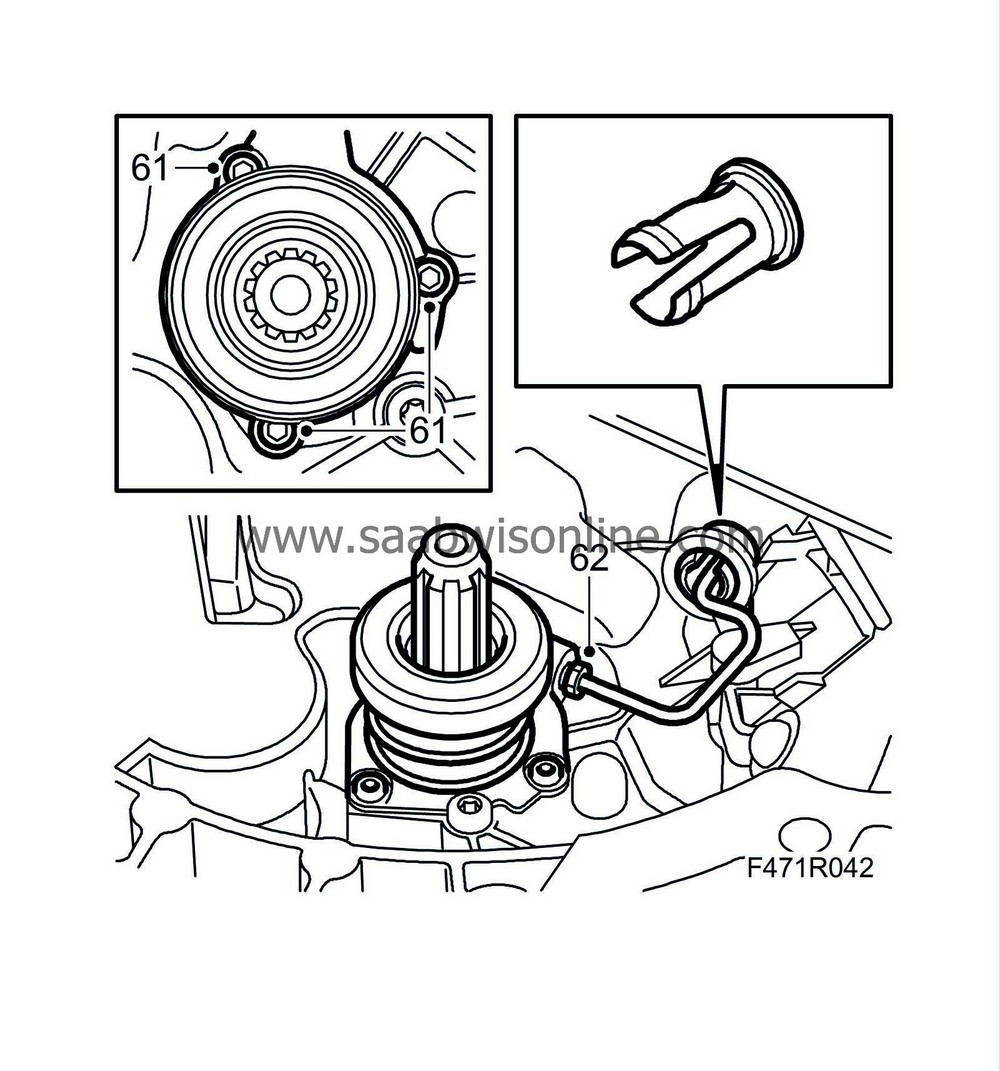
|
|
| 62. |
Fit the delivery pipe to the slave cylinder and fit the bushings.
|
|
| 63. |
Bleed the slave cylinder before fitting the gearbox. Refer to
Bleeding the slave cylinder
.
|
|
| 64. |
Remove the gearbox from the stand.
|
|

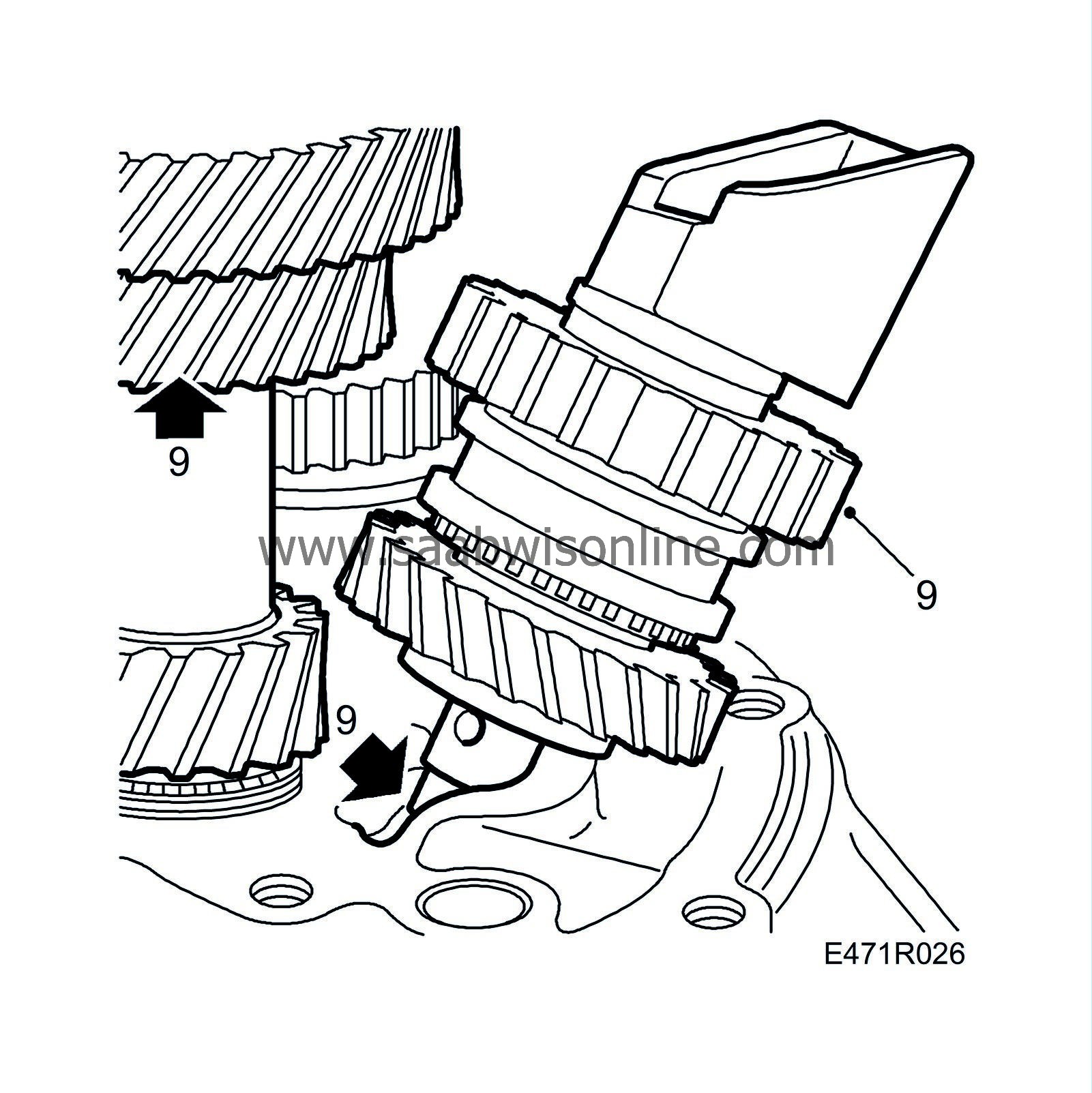
 Warning
Warning

